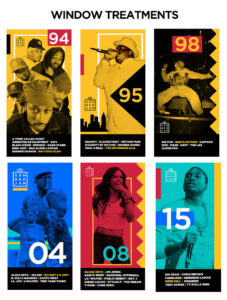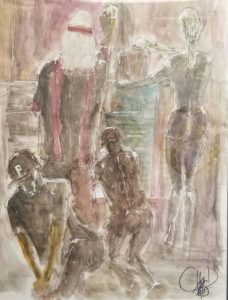
Former New York City police officer Philip McManus speaks in opposition to legalizing marijuana for recreational use in the state of New York.
The public meeting on whether or not New York should legalize marijuana hadn’t even started yet, and things were already getting heated.
“Who here loves pot?” a large, bearded man shouted as he walked into the Jamaica Performing Arts Center in Queens, the site of a Sept. 24 listening session. It was the latest on a statewide tour of events hosted by Sandra Houston, a consultant to the governor’s office, in an attempt to gather feedback as the state Legislature moves forward with its plans to draft a series of bills that would allow the legalized adult use of cannabis.
“You’re a drug user!” another person shouted from the back, later identifying himself during an equally heated portion of public testimony as retired New York Police officer Philip McManus.
“You’re an addict and a criminal,” McManus added to a chorus of resounding boos.
The flare-up was one of several throughout the night, though the majority of the several dozen people gathered all seemed to agree on some form of legalization—a testament to just how quickly the state, with Gov. Cuomo tiptoeing forward at the helm, has changed its tune on the subject.
Just last year Gov. Cuomo referred to cannabis as a “gateway drug.” A a statewide opinion poll by Quinnipiac this May, however, showed more than 60 percent approval for recreational marijuana legislation, an issue embraced to good effect by the governor’s primary challenger Cynthia Nixon. These pressures, along with twin legalization efforts in Canada and the neighboring states of New Jersey and Massachusetts, seem to have changed the governor’s mind—for now.
Advocates for the issue say they’re maintaining a healthy level of skepticism toward Gov. Cuomo, but maintain a large measure of grassroots support means legalization is more a question of “when” rather than “if.”
“So I think [Cuomo] realized he’s got to get in on this bandwagon if he wants to be reelected,” said David Holland, Executive Director of the New York chapter of advocacy group National Organization for the Reform of Marijuana Laws (NORML). “Cuomo will never be the horse pulling the cart, but he’ll certainly be the donkey trailing behind the cart, being pulled along.”
In his State of the State address earlier this year, Gov. Cuomo directed the New York Department of Health to conduct a study on the effects of legalizing marijuana. Its findings were largely positive, noting that legalization reduces the risks associated with cannabis use and would lead to lower rates of opioid prescription and addiction.
Likewise, a study earlier this year from the New York City Comptroller’s office found that legalization could net the state as much as $3.1 billion annually. The figure represents a huge windfall that could be used to reinvest in communities of color that have been disproportionately harmed by selective policing, or to fund public goods like the New York City subway system—all options presented by state lawmakers at one point or another.
Randy Vargas is a long time cannabis user who has been arrested several times for marijuana possession. Despite a long-held support for legalization, after these experiences with law enforcement he’s also developed a healthy skepticism that people like him will benefit from the effort. He attended the Sept. 24 meeting to voice those concerns.
“I came up in Harlem, and like a lot of my friends marijuana gave us criminal records early on,” Vargas said. “When they talk about regulations and licensing and all that, I just can’t stand to see individuals come from outside our neighborhood with their big degrees and big money from the bank, profiting off this like they have with everything else. We don’t want to lose out again.”
Several people in attendance at this month’s listening sessions pointed to a bill introduced last session by state Sen. Liz Krueger, D-Manhattan, as a model for the sort of comprehensive policy that they’d like to see New York adopt. Held up as the “gold standard” by New York’s Drug Policy Alliance, the Marijuana Regulation and Taxation Act would among other things direct tax revenue from cannabis sales to re-entry programs for previous offenders, as well as substance abuse and job training programs.
Despite the recent swing in public opinion, any legislation during the next session faces an uphill battle from a split Senate in Albany. Democrats technically hold the numerical advantage by one vote, but Republicans essentially maintain slim control of the chamber with the continued support of Democratic Sen. Simcha Felder of Brooklyn.
November’s elections, therefore, remain critical for advocates interested in pursuing legalization.
“Without serious changes in November, I think the legislature holds off,” Holland said, noting that the way upstate New York votes will be a key indicator of the viability of legalization efforts statewide. “They’re very conservative, and right now they’re not embracing the issue like the greater population density areas in the state.”
It’s certainly got those like Richard Henriquez watching intently as election day approaches. He’s a New York native who attended the meeting in Queens after spending the last few years in Washington state working at an organic marijuana farm with the intention of someday bringing his newfound knowledge back home.
Henriquez was eager to show off a magazine spread that had featured Cascade Growers, the company he worked for. The display garnered a round of cheers from the crowd.
It’s important for the state to take advice from workers and the people who know the industry best, he said, and not give all the opportunities to large companies—a refrain that was echoed by many others throughout the night.
“We’re going to need help if we’re going to compete with big business and make this thing happen,” Henriquez said. “I’m just glad [the state is] giving us an opportunity to get together and talk about our priorities.”











